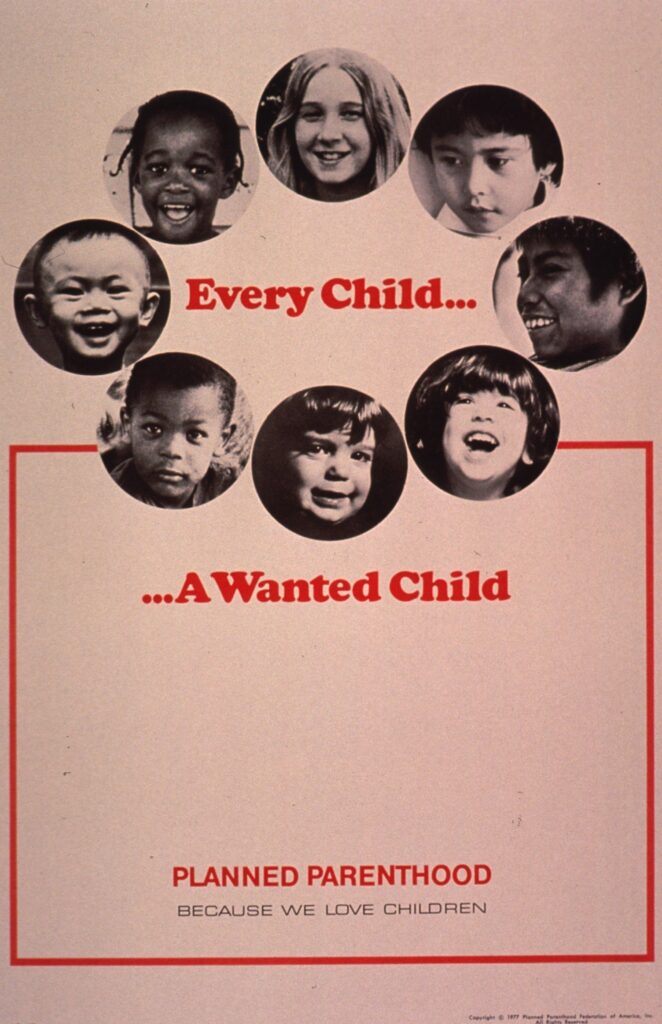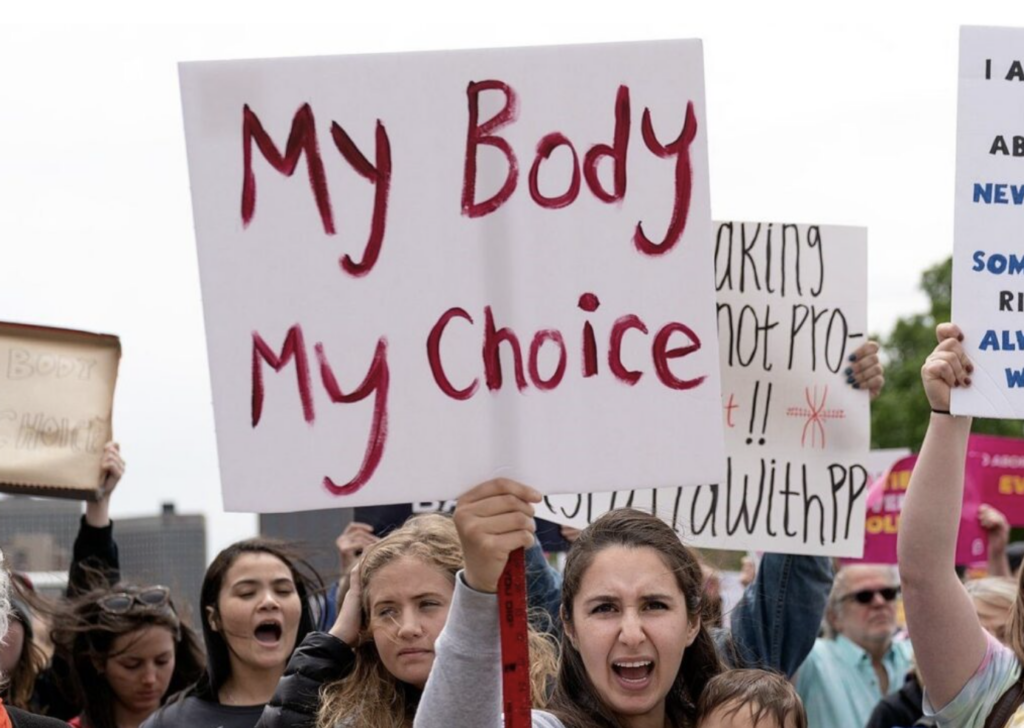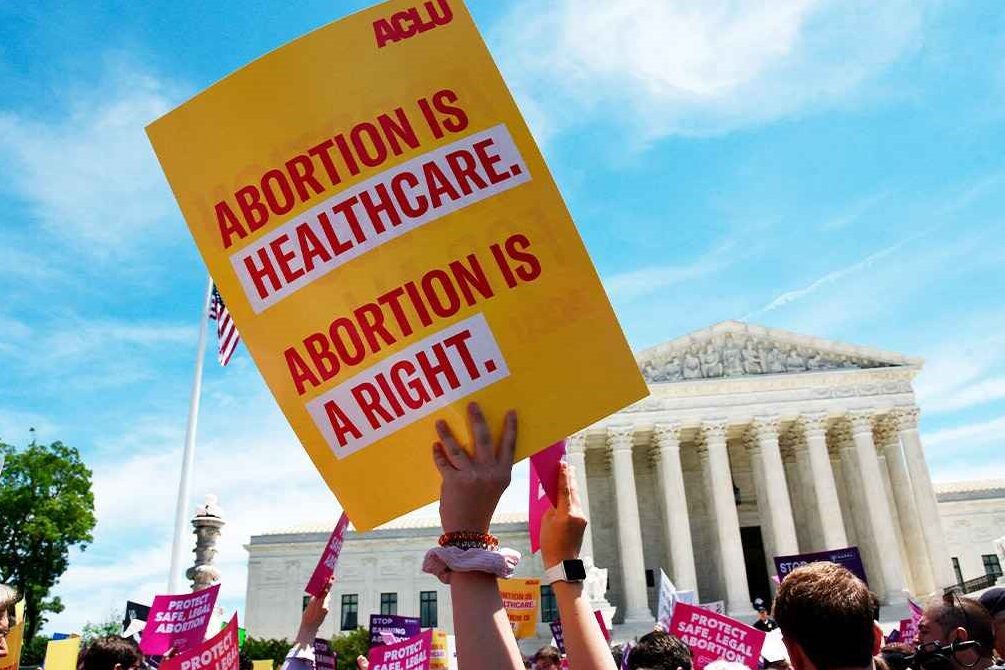
A slogan can be far more than a saying. When used wisely, a slogan can be the spark for productive debate. Slogans hold the power to pull citizens of vastly different backgrounds and beliefs to the ideological and political front lines. Slogans offer accessibility to the politically unengaged, compact complex arguments into an infectious format, and catalyze debate. Slogans are open access, democratic, artifacts of social consciousness and cultural memory in their most raw form.
From their beginnings in the early 20th century to the present day, pro-choice advocates and their organizations have made use of a variety of slogans: powerful, infectious rhetorical tools used to fight for, protect, and eventually mourn the loss of a woman’s right to an abortion in the United States. These slogans, along with the contexts of their usage, have evolved over time, from the days before 1973’s Roe v. Wade decision, to the roughly 50 years in which the decision was upheld, and to the present day in the wake of Dobbs v. Jackson. How exactly have popular slogans been used by pro-choice organizations and activists throughout history? How has the collective cultural memory of these slogans shifted over time and how might they continue to evolve in the near future?
Every Child a Wanted Child
Prior to Roe v. Wade, the pro-choice movement was driven by a dedicated, decentralized group of activists and organizations who sought to abolish restrictions on the practice [9]. It is key to note that during this time, groups faced opposition from both religious and medical organizations who viewed abortion as morally unjustifiable and deserving criminal association [2]. To combat these sentiments, pro-choice organizations sought highlight abortion’s supposed ability to solve social ills such as crime and poverty.
This line of thought gave birth to one of the period’s most well-recognized slogans: “Every Child a Wanted Child.”

This slogan, popularized by Planned Parenthood, painted a picture of the future that, on the surface, actually appealed to the period’s conservative social norms. The phrase implied abortion’s ability to eliminate out of wedlock births and therefore reinforce the nuclear family structure [10]. However, the cultural memory and employment of this slogan have evolved over time in line with shifts in attitude regarding the nuclear family since the 1970s. Today, criticism of the slogan’s implied condemnation of nontraditional family structures and out of wedlock births has led to a dramatic decrease in its use among contemporary abortion-rights activists [8].
Keep Abortion Legal | Keep Abortion Safe & Legal
After abortion was federally legalized by Roe, pro-choice proponents shifted rhetorical strategies over the coming decades, adopting slogans such as “Keep Abortion Safe and Legal” and “Keep Abortion Legal”. These slogans harnessed the memories of those who had lived during the Pre-Roe period. The generation of women who had first fought for the legalization of abortion feared a future regression where women would once again be forced to seek unsafe “back alley” abortions, putting their lives at serious risk [3]. It was this concern that these slogans sought to utilize.

Furthermore, these slogans aimed to establish abortion as a normative practice in American memory by placing emphasis on its legality and portraying abortion as something foundational to American society at large. However, since the overturning of Roe in 2022, this aspect of the phrases has been criticized [11]. Although powerful reminders of the dangers of illegal abortions prior to Roe v. Wade, the phrases were criticized by some within pro-choice circles for their defensive stance and narrow focus on the legality of abortion as opposed to a broader, more moralistic approach and justification [6].
My Body, My Choice
One such slogan that did seek a moral justification for abortion was “My Body, My Choice”, arguably the world’s most recognized slogan today.

The phrase, which first rose to prominence during the 1970s, made a succinct moral argument in favor of abortion access grounded on the moral pillars of self-determination and bodily autonomy. This slogan coincided with the period’s feminist groundswell which asserted women’s individuality and independence from traditional gender frameworks surrounding the family, individual finances, and the workplace [7]. During its reign as the world’s most widely disseminated pro-choice slogan, “My Body, My Choice” has faced a variety of hurdles. For instance, some thinkers assert that the phrase is excessively individualistic, failing to recognize or convey the broader societal benefits of reproductive freedom [4]. More recently, during the pandemic, the slogan was even hijacked by those opposing vaccine mandates [1]. Despite these obstacles and its current, ongoing evolution, “My Body, My Choice” remains frequently employed by organizations and individuals. It remains to be seen how the cultural memory of “My Body, My Choice” will shift in the wake of the pandemic and in the post-Roe era.
Then Dobbs happened.
Abortion Is a Right | Abortion Is Healthcare
Just prior to the 50th anniversary of the decision which established abortion as a legal right, the Supreme Court stripped away much of the federal protection Roe provided, affording state governments the ability to impose heightened restrictions on abortion access. In reaction to Dobbs and increased state restrictions, pro-choice advocates and organizations adapted, leaning more heavily into slogans such as “Abortion Is Healthcare” and “Abortion Is a Right”. These slogans aim to either emphasize the role of abortion as a necessary medical procedure or maintain the procedure’s status as a legally protected right, concepts that were engrained into the American consciousness during the Roe era [5].

Given how current these slogans are, their integration into American cultural memory is actively evolving. For some, they read as concrete, truthful statements while for pro-life opponents, the slogans offer little persuasion, appearing either innately false or morally blind to the existence of the unborn.
The slogans, phrases, and rhetorical tactics employed by pro-choice advocates have changed greatly over the past 75 years, reflecting American attitudes towards abortion, women’s reproductive rights, as well as broader social norms and expectations of the sexes. While some slogans such as “My Body, My Choice”, have remained poignant and frequently utilized to this day, others, such as “Every Child a Wanted Child” have increasingly been perceived as either outdated or even controversial. It is likely that the pro-choice movement and its slogans will continue to evolve and adapt to reflect and respond to changes in public opinion as well as the splintering and polarization of the American political and cultural landscape in the wake of Dobbs. The ways we remember the slogans of the past and present will too depend on the future of the broader American sociopolitical climate but also in the ways we actively choose to recall, analyze, and utilize them as integral parts of American cultural memory.
Ultimately, the effectiveness of slogans and pro-choice rhetoric will depend on their ability to reach those in the middle, mobilize supporters, and eventually have tangible impact on policy decisions related to reproductive rights.
– Luke Manna
Works Cited:
[1] Bluth, Rachel. “’My Body, My Choice’: How Vaccine Foes Co-Opted the Abortion Rallying Cry.” NPR, NPR, 4 July 2022, https://www.npr.org/sections/health-shots/2022/07/04/1109367458/my-body-my-choice-vaccines.
[2] Holland, Jennifer L. “Abolishing Abortion: The History of the pro-Life Movement in America.” The American Historian, https://www.oah.org/tah/issues/2016/november/abolishing-abortion-the-history-of-the-pro-life-movement-in-america/.
[3] Koerth, Maggie. “What the History of Back-Alley Abortions Can Teach Us about a Future without Roe.” FiveThirtyEight, FiveThirtyEight, 2 June 2022, https://fivethirtyeight.com/features/what-the-history-of-back-alley-abortions-can-teach-us-about-a-future-without-roe/.
[4] Lanphier, Elizabeth. “Is It Time to Retire the ‘My Body, My Choice’ Slogan?” FlaglerLive, 5 Aug. 2021, https://flaglerlive.com/body-my-choice-slogan/.
[5] Person, and Jan Wolfe Gabriella Borter. “Dueling Rallies as U.S. Supreme Court Confronts Abortion Rights Case.” Reuters, Thomson Reuters, 1 Dec. 2021, https://www.reuters.com/world/us/rallies-planned-us-supreme-court-hears-high-stakes-abortion-challenge-2021-12-01/.
[6] Ruffin, Alexis Lora. “The Social Construction of Abortion.” VCU Scholars Compass , Virginia Commonwealth University, 1992, https://scholarscompass.vcu.edu/cgi/viewcontent.cgi?article=5798&context=etd.
[7] “Second Wave Feminism: Collections.” Gale, Bloomington Women’s Liberation Newsletter, https://www.gale.com/primary-sources/womens-studies/collections/second-wave-feminism.
[8] Stacey, Judith. “The New Family Values Crusaders: Dan Quayle’s Revenge.” The Free Library, Farlex, 25 July 1994, https://www.thefreelibrary.com/The+new+family+values+crusaders%3A+Dan+Quayle%27s+revenge.-a015619132.
[9] Staggenborg, S. “The Survival of the pro-Choice Movement.” Journal of Policy History : JPH, U.S. National Library of Medicine, 1995, https://pubmed.ncbi.nlm.nih.gov/12346343/.
[10] Tarmann, Allison. “New Study Claims Abortion Is behind Decrease in Crime.” PRB, 1 Jan. 2000, https://www.prb.org/resources/new-study-claims-abortion-is-behind-decrease-in-crime/.
[11] Trumpy, Alexa J. “Fighting for Life: Pro-Woman Framing in the Pro-Life Movement .” OhioLINK, The Ohio State University , 2021, https://etd.ohiolink.edu/apexprod/rws_etd/send_file/send?accession=osu1306280819&disposition=inline.
Images
https://www.shutterstock.com/image-photo/woman-holding-blank-protest-sign-643939558
https://collections.nlm.nih.gov/catalog/nlm:nlmuid-101449609-img
[https://www.aclu.org/news/reproductive-freedom/for-justice-ginsburg-abortion-was-about-equality]